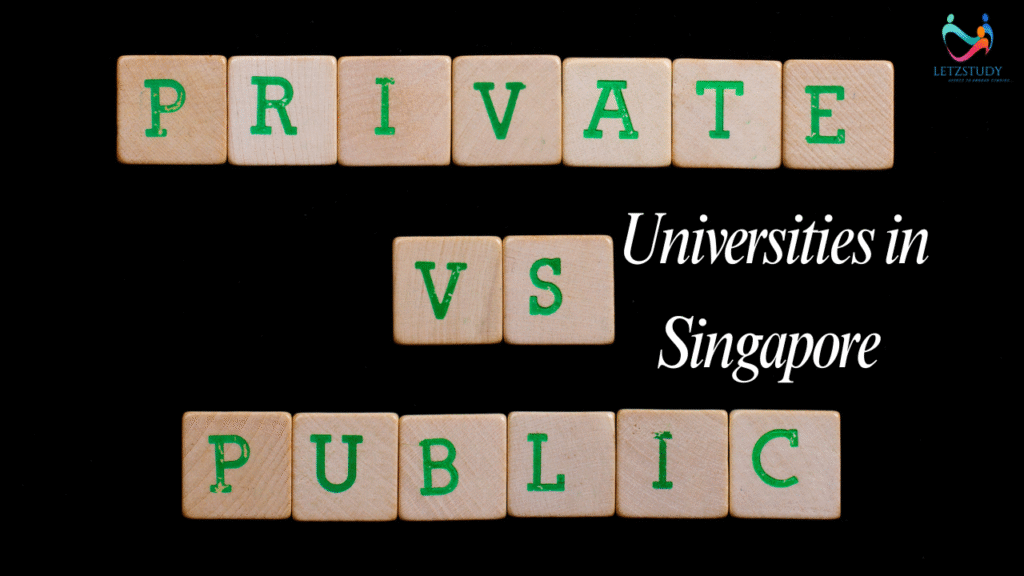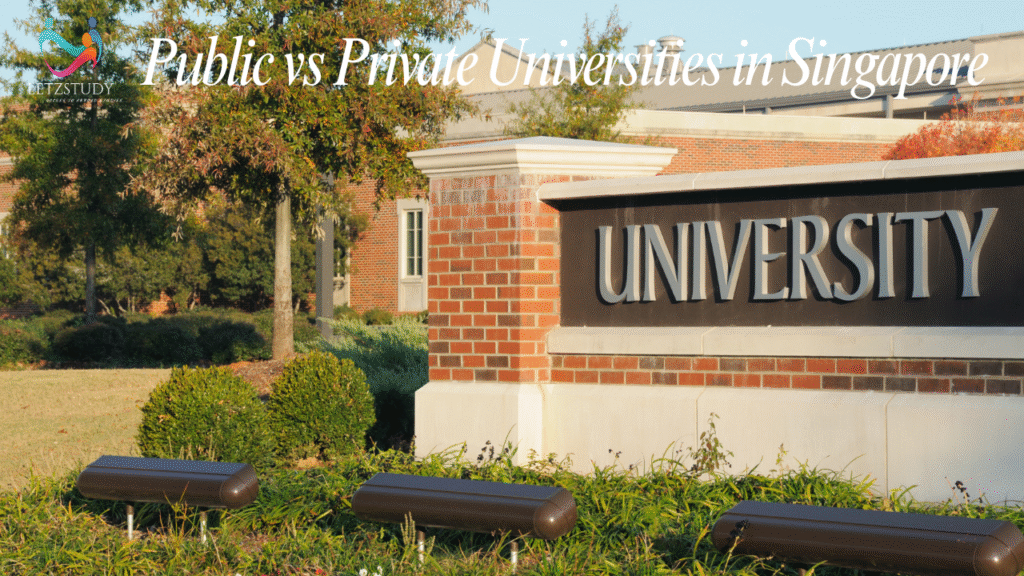
Introduction
Choosing between Public vs Private universities in Singapore, can feel overwhelming–especially when tuition fees play a major role in decision-making. Both provide an excellent education, understanding their costs and differences is essential for both parents and students. This guide offers an easy, straightforward analysis of tuition or scholarships as well as their the long-term benefits. It will help you make an informed and confident decision.
Understanding the University Landscape in Singapore
Overview of Public Universities
Singapore hosts six universities which are autonomous which include:
- National University of Singapore (NUS)
- Nanyang Technological University (NTU)
- Singapore Management University (SMU)
These institutions enjoy substantial government funding and have excellent global rankings.
Overview of Private Universities
Private universities are comprised of local and international institutions as well as collaborations. The most notable ones include:
- SIM Global Education
- Kaplan Singapore
- James Cook University Singapore
These schools usually offer flexible intakes as well as diverse courses, but are also associated with more expensive tuition costs.
Brutal Breakdown – Tuition Fees Comparison
Undergraduate Programs
Public Universities (Subsidized Tuition)
- Singapore Citizens: SGD 8,200 to SGD 9,600 a year
- Permanent Resident: SGD 11,400 to SGD 13,800 a year
- International students: SGD 17,000 to SGD 20,000 each year
Example: NUS Engineering (intake)
Citizens: SGD 8,250/year
PRs: SGD 11,550/year
Foreigners: SGD 18,600/year
Private Universities
- The typical range is from SGD 22,000 to SGD 35,000 annually regardless of nationality
- International programs could cost up to SGD 40,000 each year
Example: James Cook University Singapore – Psychology
Tuition Fee: SGD 30,420 per year (all students)
Postgraduate Programs
Public Universities
- Subsidized Master’s degrees begin from SGD 10,000/year (for citizens)
- MBA programs range between SGD 35,000 to SGD 65,000 in total costs
Private Universities
- From SGD 25,000 up to SGD 60,000, based on the program and brand’s reputation
- MBA expenses could be higher than SGD 70,000 for international collaborations
What’s Included in Tuition Fees?
Public Universities
- Access to labs, libraries, career services
- Subsidized health insurance
- Eligibility for MOE Tuition Grant Scheme (for selected students)
Private Universities
- Often includes admin and material costs
- Less access to government-subsidized amenities
- Smaller campus sizes but better faculty-to-student ratios
Scholarships and Financial Aid
Public University Support
- MOE Tuition Grant
- Scholarships (NUS, NTU, SMU-specific)
- CPF Education Scheme
- Financial aid offices provide loans and bursaries
Private University Support
- In-house scholarships based on merit or need
- Grants from partner universities for international tie-ups
- Limited access to national financial schemes
ROI – Value for Your Money
Graduate Employment Outcomes
Public University Graduates
- 93% employed within the first 6 months (MOE Survey)
- Average starting salary: SGD 3,800/month
Private University Graduates
- 76% employed within 6 months
- Average starting salary: SGD 2,800/month
- More variance depending on program quality and branding
Real Student Experiences

Public University Experience – Daniel, NTU Student
“I pay approximately SGD 8,500 annually through my Tuition Grant. My education is regarded as world-class and I got an internship before graduating.”
Private University Experience – Aishah, SIM Global
“While the fees are more expensive at 26,000 SGD per year, the classes are smaller and flexible classes allow me to work part-time, too.”
Pros and Cons Summary
Public Universities
Pros:
- Subsidized fees
- Higher prestige
- Stronger graduate employment
Cons:
- Competitive admissions
- Limited intakes per year
Private Universities
Pros:
- Flexible intakes
- Wide range of international programs
Cons:
- Higher tuition costs
- Less government funding
Summary Table – Tuition Fee Comparison
| Program Type | Public (Citizens) | Public (Intl) | Private (All) |
|---|---|---|---|
| Undergraduate | SGD 8,200/year | SGD 18,000/year | SGD 25,000–35,000/year |
| Postgraduate (Non-MBA) | SGD 10,000/year | SGD 18,000/year | SGD 25,000–40,000/year |
| MBA Programs | SGD 40,000 total | SGD 60,000 total | SGD 60,000–75,000 total |
What Is Public vs Private Universities in Singapore: Tuition Fee Comparison?
Defined:
This comparison outlines the key differences in tuition costs between public institutions (e.g., NUS, NTU) and private institutions (e.g., SIM, Kaplan), analyzing subsidies, fees, and long-term financial impact.
Featured Snippet List: Key Differences
- Public Universities: Subsidized tuition (S$8,000–S$12,000/year for locals)
- Private Universities: Higher fees (S$20,000–S$40,000/year)
- Grants: Only available for public universities
- Programs: Private universities offer more niche/international programs
- Recognition: Public university degrees often carry more weight
- Admissions: Private universities have more flexible entry
6 Common Causes of Tuition Fee Problems
- Lack of clarity about government subsidies
- Misunderstanding course duration and hidden charges
- Over-reliance on financial aid
- Ignoring living expenses
- Impact of inflation and foreign exchange
- Not comparing total cost vs career ROI
13 Expert Tips for Managing Tuition Fee Differences
- Use MOE’s Tuition Grant Calculator
- Opt for universities with high employability outcomes
- Apply early for grants and bursaries
- Explore hybrid/part-time program options
- Compare courses across public and private universities
- Attend university webinars and open houses
- Don’t overpay for international brand names
- Get alumni insights on fee-to-value
- Check diploma-to-degree pathways
- Try negotiating fees with private institutions
- Review graduate employment stats
- Use CPF Education Scheme if eligible
- Consult with local experts like LetzStudy
Insights from Experts and Influencers
“A public university degree could cost less; however, it’s the knowledge and network that determine ROI, not just the name.”
— Dr. Rachel Tan, Higher Ed Researcher, NUS
“Singapore’s private institutions are becoming globally competitive. Weigh your options wisely.”
— Jeremy Koh, Education Influencer @EduSmartSG
Understanding Others’ Point of View
Students’ Perspective
Students at private universities value flexible admissions and diverse international programs.
Parents’ Concerns
Parents often prioritize tuition costs, government support, and long-term value.
Recruiters’ Take
Employers focus more on skills and experience, though NUS/NTU still carry significant weight.
Statistics and Data
| Type | Local Tuition (S$) | International Tuition (S$) | Avg. Job Placement Rate |
|---|---|---|---|
| Public (e.g., NUS) | 8,200–12,000/year | 30,000–38,000/year | 92% in 6 months |
| Private (e.g., SIM) | 20,000–40,000/year | 25,000–45,000/year | 80–85% in 6 months |
Source: MOE Singapore, LetzStudy Insights
Case Study: Choosing Between SIM and NTU
Student: Priya M., Karnataka
Options: Bachelor in Business at NTU vs. SIM
Fees: NTU (S$9,400/year after subsidy), SIM (S$23,000/year)
Decision: Chose NTU for better ROI after LetzStudy’s advice
Result: Employed at DBS within 4 months
Three Expert Article Titles
- “The Real Cost of Education: Comparing Public and Private Universities in Singapore” – Prof. Kishore Mahbubani
- “Breaking Down Singapore’s Tuition Fees: A Transparent Guide” – Linda Lim
- “Value vs Expense: A Data-Driven Look at Public and Private University Costs” – Chua Beng Huat
Expert Quotes
“While private universities offer unique programs, public ones often provide greater ROI through subsidies and recognition.”
— Prof. Linda Lim
“Understanding what you’re paying for is key—it’s not just fees, but future opportunities.”
— Kishore Mahbubani

How LetzStudy Helped Three Students to know Public vs Private Universities in Singapore
Sahana from Mysuru – Chose Quality & Affordability
Sahana was split between a private design college and NUS for Architecture. Private tuition: SGD 35,000/year. NUS: SGD 10,000/year (with grant). LetzStudy broke down scholarship options and ROI. She saved ₹25L and now studies at NUS with global exposure.
Manoj from Hubballi – Balanced Budget with Vision
Manoj chose NTU over SIM after LetzStudy explained subsidy benefits. NTU cost: SGD 9,500/year vs. SIM: SGD 18,000/year. Better internship options, world-class campus, and stayed on budget.
Divya from Udupi – Private University, Maximum ROI
Divya wanted a Digital Media program not available at public unis. MDIS offered it but cost SGD 28,000/year. LetzStudy helped her negotiate a 20% discount and create a part-time work plan. She’s now interning with a top media firm.
Universities regularly update their fees, eligibility, and policies. While we aim to keep this content accurate, readers should always check official sources for the latest information.
Ready to find the best-fit university in Singapore for your goals and budget?
Contact LetzStudy today and book your personalized consultation!
For more information, connect us on LinkedIn, and for daily updates, follow us on Instagram.
Universities regularly update their fees, eligibility, and policies. While we aim to keep this content accurate, readers should always check official sources for the latest information.

